18 Best Fruits & Vegetables to Keep You Fuller Longer
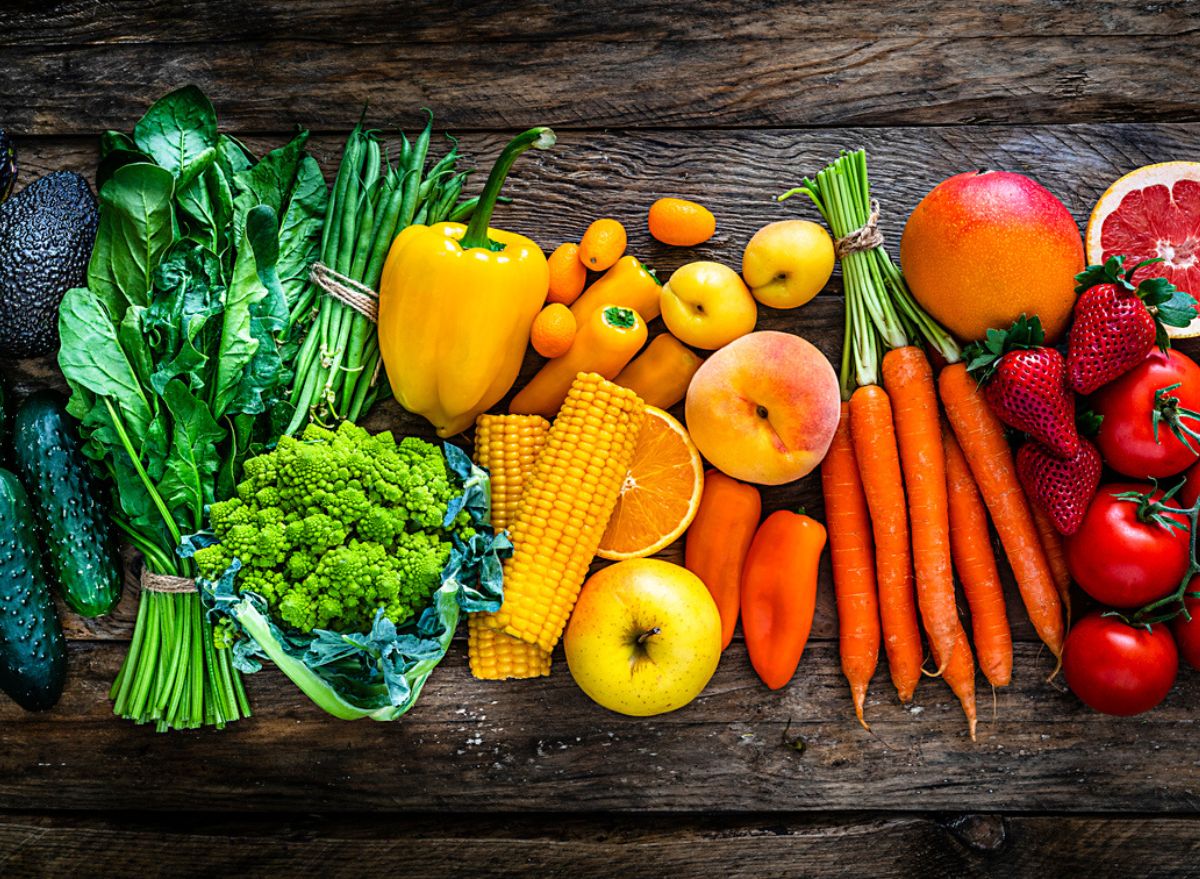
Produce can do wonders for your health. When you eat plenty of fruits and vegetables, you’re giving your body a boost of vitamins, minerals, antioxidants, and crucial nutrients it needs in order to function optimally. In fact, eating enough produce on a daily basis has been shown to help reduce the risk of heart disease, lower your blood pressure, and in some cases, potentially reduce your risk of certain cancers, too. Along with all of that, there are certain fruits and vegetables that can keep you feeling full for longer periods of time.
“When looking for filling produce, aim for those that have fiber, healthy fats, and/or protein, as these macros have been shown to help promote satiety by slowing the digestion process,” says Lauren Manaker, MS, RDN, registered dietitian and author of The First Time Mom’s Pregnancy Cookbook and Fueling Male Fertility.
Even though all fruits and vegetables can be a part of a healthy, balanced diet, the following dietitian-recommended produce items can help contribute even more to feeling full and satisfied because of the nutrients they contain. Read on, and for more, don’t miss 5 Best Fruits and Vegetables To Eat for Weight Loss.
Fruit to keep you full longer
Avocado
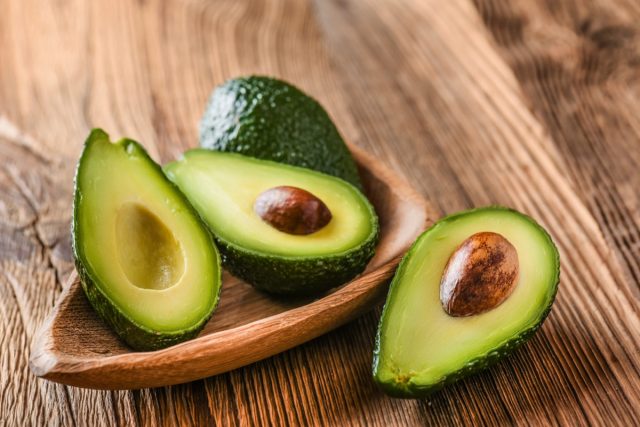
Fiber per fruit: 13.5 grams
Total fat per fruit: 15 grams
When it comes to a fruit that’s going to help keep you full, avocados are one of the best and most reliable. “Packed with healthy fats and fiber, avocado tops the list,” says Manaker. “The healthy fats may slow gastric emptying, which can help you feel satisfied for a longer period.”
“The fiber in avocados also aids in digestion and contributes to a sense of fullness, and avocados have a creamy texture that adds richness to meals, making them a satisfying and versatile addition to various dishes,” says Trista Best, MPH, RD, LD at Balance One Supplements.
Watermelon
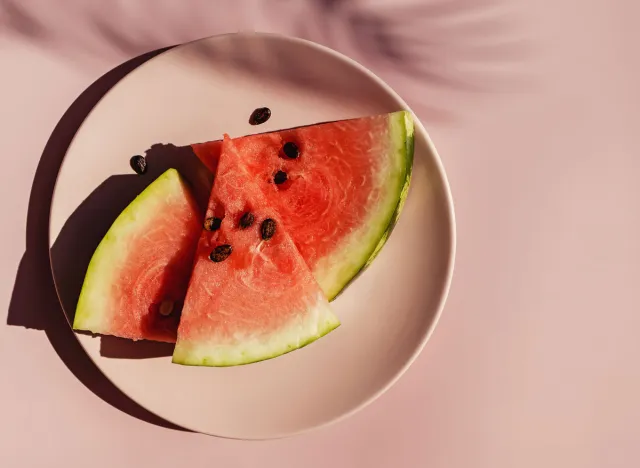
Fiber per 1 cup, diced: 0.6 grams
Water Content: 92%
Feeling full doesn’t always come just from eating fibrous foods. “Sometimes, maintaining your hydration can help you feel fuller,” says Manaker. “And since watermelon is 92% water, noshing on this fruit may do the trick.”
Manaker adds that some studies have found that consuming water before and during your meal can help increase your satiety, meaning the extra water content in watermelon may help you feel just a bit more full.
Blackberries
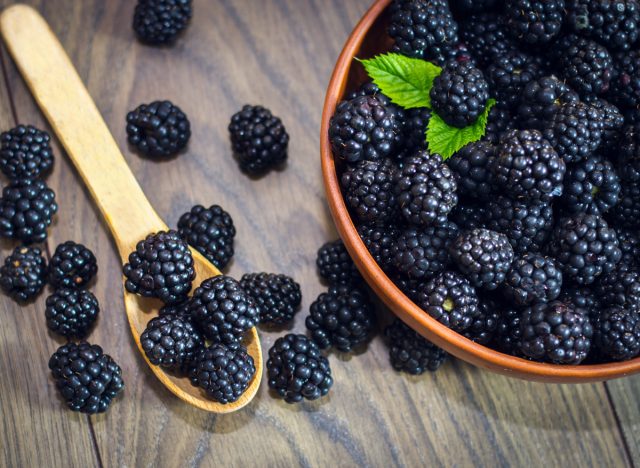
Fiber per 1 cup: 7.6 grams
Water Content: 88%
When it comes to finding snacks that can help keep you full, fiber is an important quality. This is because fiber can help to suppress your appetite by slowing down your body’s rate of digestion, making you feel full longer. If you’re looking for a fruit or vegetable that fits this bill, blackberries are an easy and delicious option.
“Blackberries are an excellent fruit to incorporate into your daily breakfast routine, as they contain almost 8 grams of fiber per cup,” says Lisa Young, PhD, RDN, author of Finally Full, Finally Slim. “Moreover, they do not contain too many natural sugars, making this the perfect fruit to keep your blood sugar at bay.”
Bananas
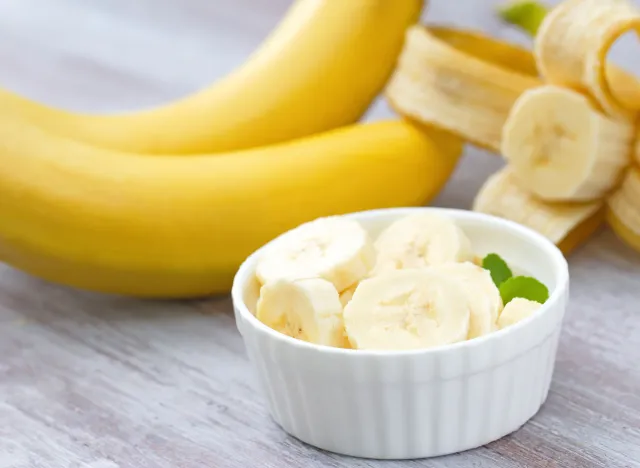
Fiber per 1 medium fruit: 3 grams
Water Content: 75%
Bananas may not have as much fiber as a cup of blackberries, but this fruit still contains around 3.5 grams in one whole banana, which will contribute to your overall fiber count for the day. Young also suggests bananas because along with containing some fiber, “they are also fairly low in calories and extremely versatile— they can be eaten fresh or can make a great frozen treat,” she says.
Prunes
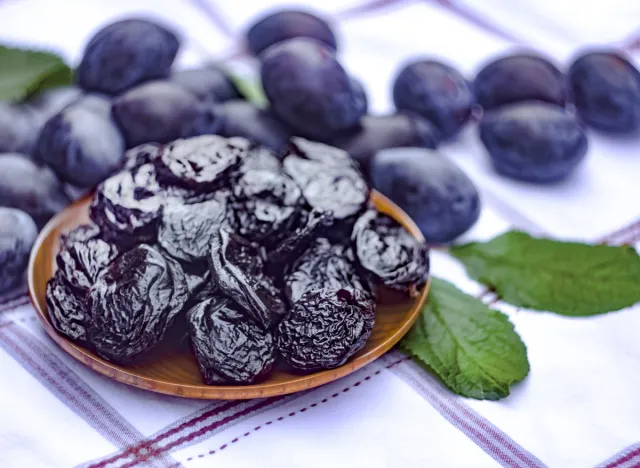
Fiber per 1 cup, pitted: 12.4 grams
You’ve most likely heard of munching on some prunes when you need to poop, but this snack can also help make you feel more satiated, too.
“In one study, snacking on prunes resulted in less hunger than snacking on raisins or a jellybean-like candy,” says Manaker. “In fact, people who snacked on prunes ate fewer calories at their next meal than those who snacked on the other foods, too.”
So why do prunes make you feel more satiated, while also helping you go to the bathroom? It ultimately has to do with their higher fiber content, with about 6 grams of fiber per 1/2 cup.
Raspberries
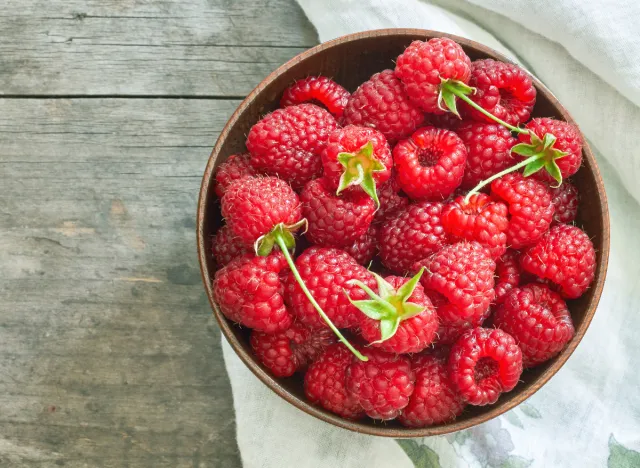
Fiber per 1 cup: 8 grams
Water Content: 86%
According to Manaker, another higher-fiber fruit to try that can help you feel more full are raspberries, which have about 8 grams of fiber per cup.
“Raspberries are a lower-calorie, higher-fiber fruit compared to many other fruit choices, making them a perfect addition to your diet if you are trying to feel fuller longer,” says Manaker. “Try adding raspberries to unexpected dishes, like salads, for a filling fiber boost.”
Along with having a decent amount of fiber, this fruit is also fairly low in sugar compared to other fruits, with only about 5 grams per cup.
Blueberries
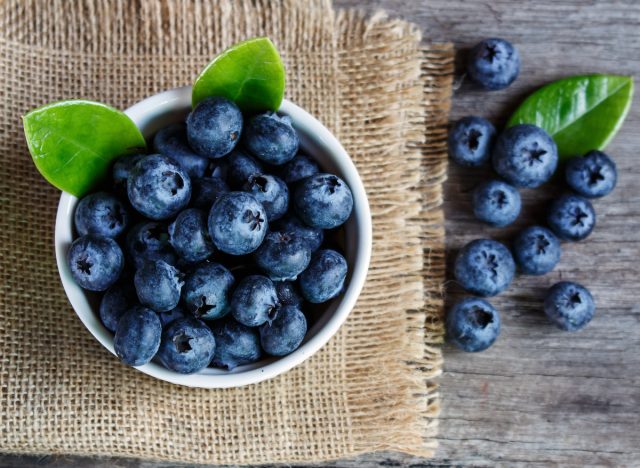
Fiber per 1 cup: 3.5 grams
Water Content: 84%
Similarly to raspberries, blueberries are a higher-fiber, lower-sugar fruit that is perfect to snack on and help you feel more full.
“Berries are great for their high fiber content because fiber helps slows down digestion, promoting a gradual release of sugars into the bloodstream and preventing rapid spikes in blood sugar levels, which can lead to hunger shortly after eating,” says Best. “Additionally, the water content in berries adds volume to the stomach, contributing to a sense of fullness. The combination of fiber and water in berries helps keep you satisfied and reduces the likelihood of overeating or snacking between meals.”
Young adds that along with being higher in fiber, blueberries are also packed with a ton of other helpful vitamins and nutrients. “Blueberries are often referred to as a superfood because of their nutrient content, and they are high in things like vitamin C, vitamin K, and manganese while being very low in calories,” says Young. “Moreover, these berries are also an antioxidant, which can help in protection against free radicals.”
Pears
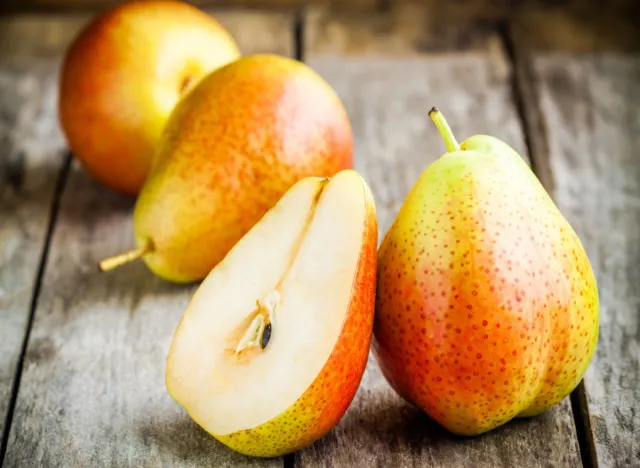
Fiber per 1 cup: 5.5 grams
Water Content: 84%
Whether you want to bite into one on its own, or chop it up and add it to your bowl of oatmeal or yogurt, pears are another great fruit for helping to keep you feeling full longer.
One thing about pears is that not only do they contain fiber, but they contain “a specific type of dietary fiber called pectin,” says Young. Pectin is found in pears, apples, and plums and has been found to help slow digestion, as well as improve the health of your gut microbiome.
Olives
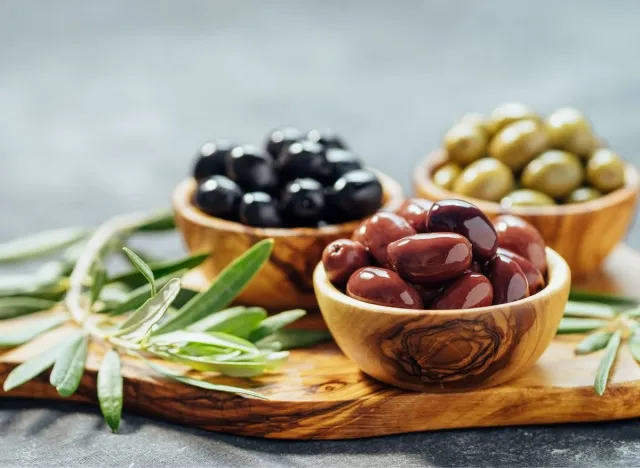
Fiber per 1/2 cup: 1 gram
Total fat per 1/2 cup: 7 grams
Fiber isn’t the only thing that can help a food feel more satiating. Sometimes the existence of healthy fats can have a similar effect. According to the National Center for Biotechnology Information, healthy fats can do this by helping to reduce hunger hormones and slow digestion.
There aren’t many fruits out there that contain healthy fats, but “Olives are technically a fruit, and the healthy fats that they provide can help you feel satisfied for longer,” says Manaker. “Just be mindful of how many olives you eat, as they can be quite sodium-packed.”
Apples
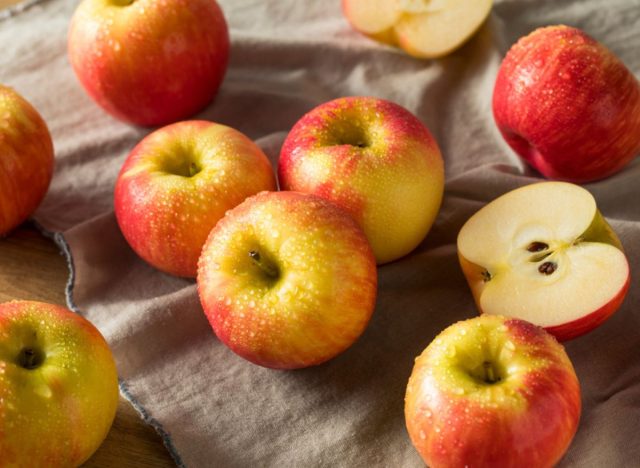
Fiber per 1 medium fruit: 4 grams
Water Content: 85%
Eating an apple a day might do more than keep the doctor away, as this fruit can also help you feel more full between meals.
“Apples are a good fruit to eat to stay full for a long time because they are a rich source of soluble fiber, particularly pectin, which slows down digestion and promotes a feeling of fullness,” says Best. “The fiber content in apples helps regulate blood sugar levels, preventing sudden spikes and subsequent hunger pangs.”
Young also adds that “Research has shown that a high-fiber intake is linked to lower body weight and a significantly reduced risk for obesity.”
Gold kiwis
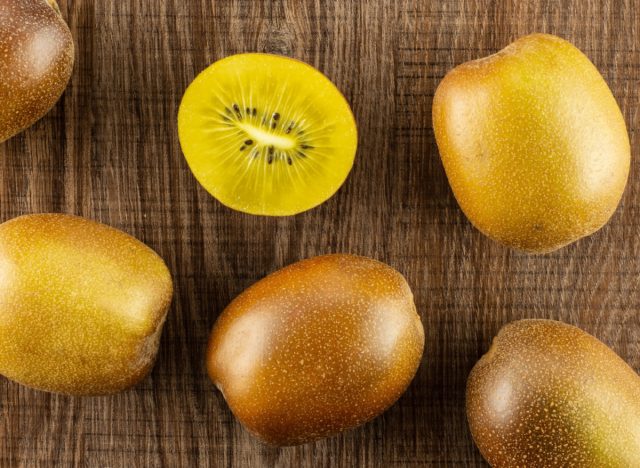
Fiber per 1 medium fruit, flesh included: 2 grams
If you haven’t tried a gold kiwi yet, you’re missing out on a uniquely sweet and tart flavor as well as 4 grams of fiber.
According to Manaker, “Two Zespri SunGold Kiwis provide 2 grams of fiber if you only eat the flesh, but a whopping 4 grams if you eat the skin too.” Unlike regular green kiwis, gold kiwis have a smooth and hairless skin you can eat.
Manaker also adds “These kiwis not only provide satisfying fiber, but they also contain 20 vitamins and minerals, including more than 100% of your daily need of vitamin C.”
Cucumbers
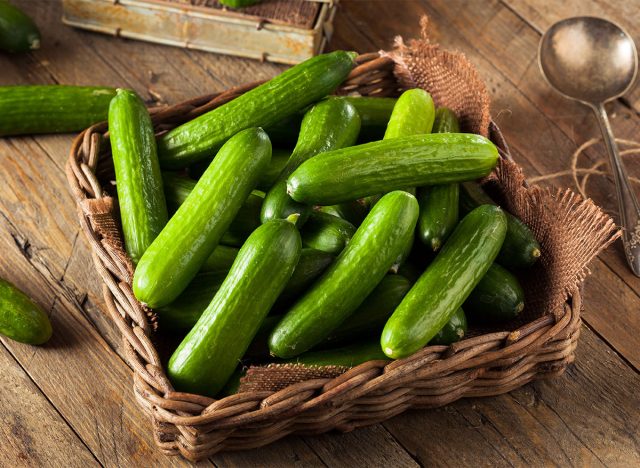
Fiber per 1 cup: 0.6 grams
Water Content: 95%
“Cucumbers are a good vegetable to eat to stay full for a long time because they are low in calories but high in water content. The high water content helps to fill the stomach, promoting a feeling of fullness. Due to their low-calorie nature and ability to add bulk to meals, cucumbers can be a helpful component of a balanced diet for managing hunger and supporting weight management,” according to Best.
Vegetables to keep you full longer
Artichokes
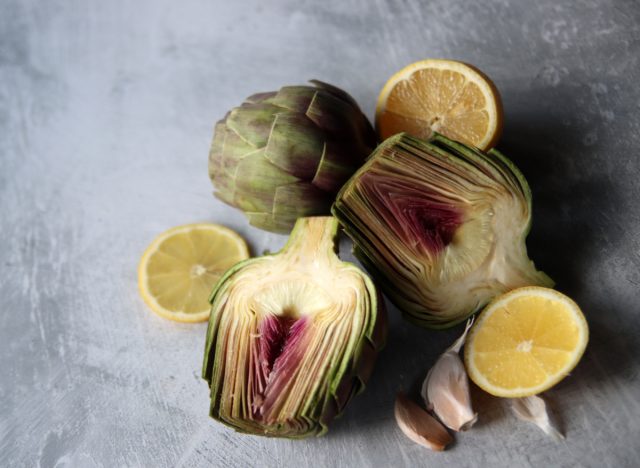
Fiber per medium artichoke: 7 grams
Water Content: 85%
There are many types of vegetables that have similar satiating qualities as the fruit we mentioned above. For starters, artichokes are a vegetable that is often overlooked, but chowing down on this unique veggie at lunch or dinner can help you feel more full.
“Artichokes are one of the highest fiber-containing veggies, making them an ideal choice to help you feel fuller longer,” says Manaker. In fact, in one large artichoke, you’ll get around 7 grams of fiber and only 1 gram of sugar. “Plus, they are packed with antioxidants to support your overall health too,” adds Manaker.
Beans
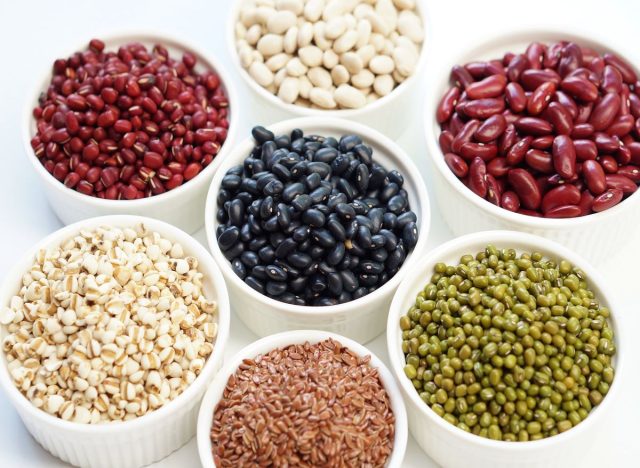
Fiber per 1/2 cup black beans, canned: 8 grams of fiber
“Even though some people forget that beans are considered a vegetable,” says Manaker, “but because they are packed with satiating protein and fat, they can do the trick if you are looking for a stick-to-your-ribs veggie option.”
Take black beans, for instance. A cup not only contains about 16 grams of fiber but also provides around 14 grams of protein. Protein is a nutrient that can help you feel full longer helping to reduce hunger hormones and cravings.
Carrots
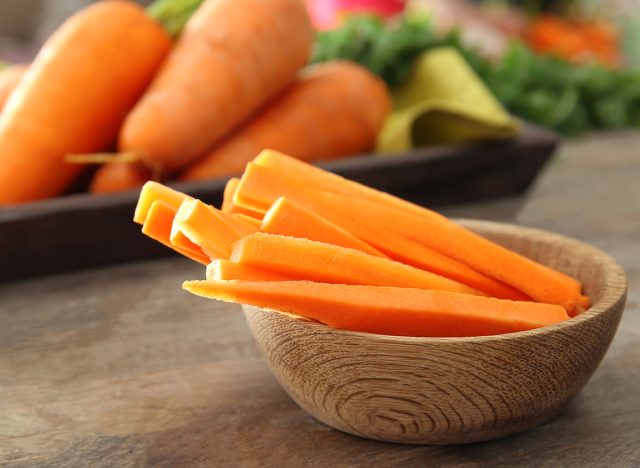
Fiber per 1 cup, chopped: 3.5 grams
Water Content: 88%
Best says that carrots are an amazing vegetable to snack on when you’re wanting to fill up faster, as “carrots have a crunchy texture that can satisfy the need for a satisfying snack, and their low calorie content makes them a great option for those looking to manage their weight while still feeling full and satisfied.”
She also adds that similarly to some of the other fruits and vegetables that we mentioned, carrots are also rich in fiber, “which slows down digestion and promotes a feeling of satiety,” says Best. “The fiber in carrots also helps to stabilize blood sugar levels, reducing sudden spikes and crashes in energy that can trigger hunger.”
Watercress
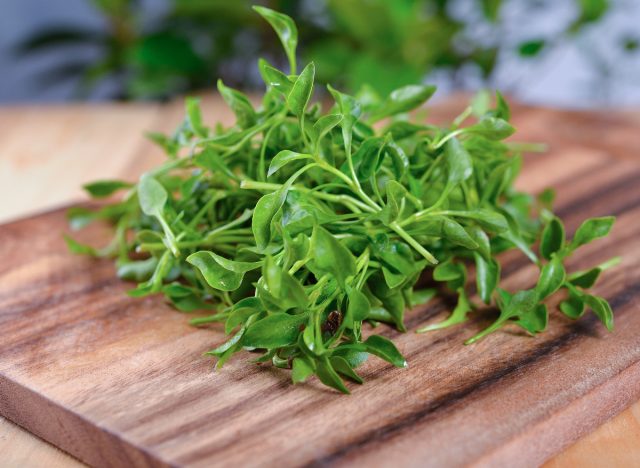
Fiber per 100 grams (3 cups): 0.5 grams
Water Content: 95%
For the amount of nutritional benefit it provides, watercress is not talked about nearly enough. And aside from its “antioxidants and micronutrients that can help support many aspects of your overall health too,” says Manaker, watercress can “fuel your body with additional fiber with very little calories.”
If you need ideas on how to eat this vegetable, try adding “a handful of watercress to your smoothies, salads, and sandwiches, which will give your dish a slightly peppery satisfying taste.”
Mushrooms
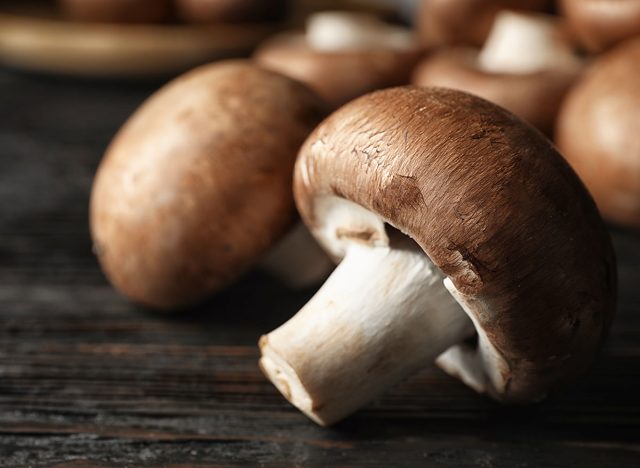
Fiber per 1 cup, whole: 0.5 grams
Water Content: 92%
Mushrooms may be small, but they are a surprisingly satisfying food to include in your dishes. According to Manaker, “One study that had participants eat two servings of mushrooms or meat for ten days at breakfast showed that participants reported less hunger, greater fullness, and decreased prospective consumption after the mushroom breakfast.” She adds that “these results suggest that eating mushrooms for breakfast can lead to increased satiety over morning meals that contain meat, which can lead to the decrease in overall calorie consumption necessary for weight loss.”
Cauliflower
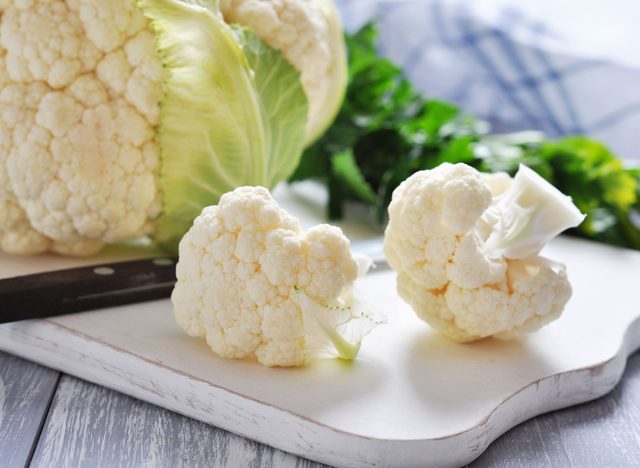
Fiber per 1 cup, chopped: 2 grams
Water Content: 92%
Cauliflower is a helpful vegetable to eat for multiple reasons. For one, “Cauliflower contains about 2 grams of fiber, which can promote feelings of fullness,” says Young. Not only that, “but this cruciferous vegetable contains a plethora of nutrients while being fairly low in calories, making this a nutrient-dense option to try.”
And on top of containing fiber and other helpful nutrients, you can also use cauliflower to make healthier versions of rice, pasta, or meat products, or you can toss frozen cauliflower into your smoothies for a tasteless texture enhancer.
- Source: https://www.hsph.harvard.edu/nutritionsource/what-should-you-eat/vegetables-and-fruits/
- Source: https://www.ncbi.nlm.nih.gov/pmc/articles/PMC6209729/
- Source: https://fdc.nal.usda.gov/fdc-app.html#/food-details/173946/nutrients
- Source: https://onlinelibrary.wiley.com/doi/abs/10.1111/nbu.12528
- Source: https://fdc.nal.usda.gov/fdc-app.html#/food-details/167755/nutrients
- Source: https://pubmed.ncbi.nlm.nih.gov/25623312/
- Source: https://www.ncbi.nlm.nih.gov/books/NBK53550/#:~:text=Within%20a%20controlled%20environment%2C%20yes,are%20more%20satiating%20than%20others.
- Source: https://www.ncbi.nlm.nih.gov/pmc/articles/PMC6768815/
- Source: https://fdc.nal.usda.gov/fdc-app.html#/food-details/169205/nutrients
- Source: https://fdc.nal.usda.gov/fdc-app.html#/food-details/175188/nutrients
- Source: https://fdc.nal.usda.gov/fdc-app.html#/food-details/175188/nutrients
- Source: https://pubmed.ncbi.nlm.nih.gov/16950139/
- Source: https://www.sciencedirect.com/science/article/abs/pii/S0195666317305998?via%3Dihub









